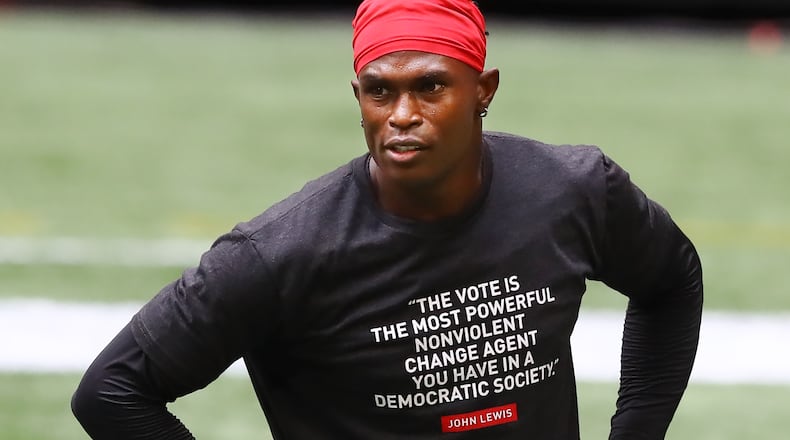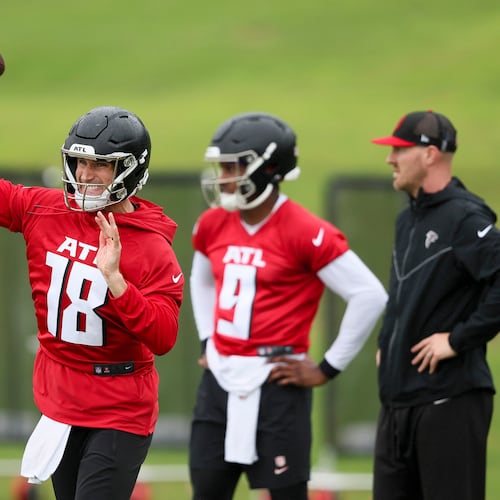Over 10 years ago, Detroit police executed a nighttime raid at a home on the city’s east side in search of a murder suspect. In the process, the gun belonging to police officer Joseph Weekley fired, with a bullet fatally striking 7-year-old Aiyana Stanley-Jones.
A suspect, Chauncey Owens, was apprehended during the raid, which began with a flashbang and resulted in the loss of a child’s life.
This football season, NFL players are allowed to wear decals supporting victims of injustice on the back of their helmets. Falcons wide receiver Julio Jones chose Stanley-Jones to honor.
Jones said he didn’t pick her story because it was more important than anyone else’s when it comes to the national dialogue on social justice issues. But her story tugged at his heartstrings, considering that before the raid, Stanley-Jones was simply a 7-year-old girl asleep on a couch with her grandmother.
“She was never able to experience her life or have a life, at 7 years old,” Jones said. “Me being a child of an African-American, we always have to put ourselves in those situations and wonder what if things like that could have happened to us. Everything about this is tragic. At the end of the day, it’s on us to shine a light on it and do something about it.”
Stanley-Jones' death drew national attention due to the circumstances surrounding the case. On the evening of May 16, 2010, the Detroit Special Response Team planned a raid to apprehend Owens, who was accused and later convicted of killing 17-year-old Je’Rean Blake. However, it was later revealed Owens had been entering and leaving the property freely during the day, suggesting such a raid might be unnecessary.
The raid began when the Special Response Team threw a flash grenade into the home, with it landing near where Stanley-Jones and her grandmother were sleeping. The flash grenade burned the blanket the child was sleeping with. The Special Response Team then entered the house, with Weekley’s gun going off and striking Stanley-Jones in the head.
Filming the raid from outside was a crew from the A&E show “The First 48.”
Weekley went to trial and was charged with involuntary manslaughter and reckless use of a firearm. Weekley claimed the gun accidentally went off after Stanley-Jones’ grandmother Mertilla Jones grabbed it. Mertilla Jones denied that she ever touched the gun.
Weekley was tried twice, in 2013 and 2014, with both trials resulting in hung juries. He did not stand trial a third time.
Julio Jones is one of six NFL players to bring awareness to Stanley-Jones, whose story has mostly been out of the national news cycle. The other NFL players sporting her name on their helmets are Nyheim Hines (Colts), Gerri Green (Colts), Charles Jones (Jaguars), Josh Jones (Jaguars) and Jerome Baker (Dolphins).
As a Black man from Foley, Alabama, located on the Gulf of Mexico, Jones said stories such as Stanley-Jones' strike a chord based on the experiences he had growing up.
“Every incident and situation hit me. I’m from it,” Jones said. "Not saying where I’m from is bad, right? I’m from Alabama. I’ve dealt with a lot of stuff. I’ve dealt with things that supposedly a normal kid shouldn’t deal with as far as racism and things like that. Everybody has their story. It’s going to hit different for everybody depending on where you’re from.
“If you’re up North or from the South, all of us experience racism differently. It’s just being treated as human beings. All of us experience that stuff differently. For me, since the beginning and since I was younger, it happened to me. I understand the meaning of it -- marching, rioting, so forth and so forth. When you get fed up, you get tired of things not being done.”
Although Weekley was never found culpable by a jury of his peers, the city of Detroit agreed to settle a wrongful death lawsuit with Stanley-Jones' family in April of 2019 for a reported $8.5 million.
Jones said he wants to use his stature as an NFL player to shine some light once again on what happened to Stanley-Jones a decade ago. Had she not been killed that night, Stanley-Jones would have turned 18 this past July.
“It’s more so about bringing awareness to the situation,” Jones said. “The sad part is that we have people I could keep putting on my helmet, right? And we shouldn’t have to go through this kind of stuff and have to bring awareness to this kind of stuff. It shouldn’t be happening. But it happened. I’m here and I’m using my platform to bring awareness to it.”
About the Author
Keep Reading
The Latest
Featured

